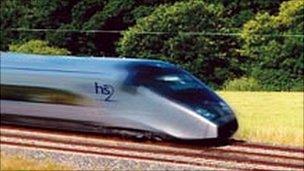HS2: Good case for high-speed rail link, say MPs
- Published
- comments

High-speed trains would travel at speeds of up to 250mph between London and Birmingham
There is a "good case" for the government's HS2 high-speed rail link between London and Birmingham and beyond, a committee of MPs has said.
The £32bn scheme offers "a new era of inter-urban travel in Britain", the Commons Transport Committee says.
But its report, external says the route must be extended to Leeds and Manchester.
Opponents said the report left HS2 "in tatters" because MPs said they could not be sure it would bring the economic benefits ministers predict.
The committee's support for the rail link, which aims to cut the London-to-Birmingham journey time to 49 minutes, came with a number of provisos.
The committee demanded that ministers "firmly commit" to extending the high-speed link to both Leeds and Manchester before seeking Parliamentary approval for the London to Birmingham route.
The MPs also said what should have been a serious and factually-based debate had "too often been reduced to name-calling and caricature", and they demanded the government "desist from disparaging opponents of HS2 as nimbys".
They warned the government it would be "unacceptable and counterproductive" if investment in high-speed rail led to cutbacks in rail investment elsewhere.
Transport Secretary Justine Greening has said she will meet MPs who are concerned about the plans later this month.
Ms Greening says she will publish a full transcript of the 21 November meeting.
Her department received about 55,000 responses to its recent consultation on the rail plans. In a statement, Ms Greening said she was being "provided with detailed information on the issues raised".
'Dramatic improvement'
The Labour chair of the committee, Louise Ellman, said the scheme was affordable and would provide a "step change" in the quality and frequency of rail services between major cities.
It would offer potential economic and strategic benefits which conventional lines do not, as well as dramatically improving connectivity between major cities, Heathrow and other airports, and the rest of Europe, she said.
"High-speed rail may be a catalyst for economic growth, helping to rebalance the economy and bridge the north-south divide.
"But the government must do more to promote local and regional growth strategies to ensure we get maximum economic benefit from high-speed rail."
The plans have strongly divided opinion along the 120-mile route between London and Birmingham, with supporters launching a "Their Lawns or Our Jobs" poster campaign, and opponents touring the country with a 10ft inflatable white elephant.
The MPs accept that the proposed route is likely to have "substantial impacts" on those living along it, adding that it is "unfortunate" that it crosses the Chilterns area of outstanding natural beauty.
They suggest that noise impact "may be less than feared" but urge ministers to try to build the new line close to existing transport routes if possible.
Claims by ministers that HS2 would reduce carbon dioxide emissions "do not stand up to scrutiny", the committee said.
Louise Ellman says it is wrong to dismiss locals' concerns about the project
However, the MPs said it would produce less carbon than an expanded motorway network or greater domestic aviation in the event of increased demand for inter-urban travel.
'Substantial impacts'
The MPs also said that a case for routing HS2 via Heathrow had not been set out clearly.
Jerry Marshall, chair of Action Groups Against High Speed Two (Aghast), said: "Given the partisan composition of the committee, we welcome the significant number of issues that its report has raised around the fatal flaws in HS2's business case.
"These are that viable alternatives to HS2 have not been investigated thoroughly, that the value of potential productivity gains delivered by HS2 have been greatly inflated and, lastly, the technical feasibility of being able to run 18 trains per hour is a risk. This simply leaves the case for HS2 in tatters."
The Association of Train Operating Companies and the Campaign for Better Transport said the high-speed rail link was vital, but it should not come at the expense of investment in the rest of the rail network. Passenger Focus said that while HS2 was many years away, it welcomed the government's commitment to solving more immediate rail capacity issues.
RMT leader Bob Crow said the transport union supported the investment, but added: "HS2 should be publicly owned and run, and free from the greed and fragmentation of privatisation that has wrecked UK rail for a generation."
The Countryside Alliance welcomed the committee's emphasis on the environmental impact of HS2. "We hope that this recommendation extinguishes, once and for all, any charges of nimbyism directed at people who wish to see our most-cherished landscape preserved for future generations," added Alice Barnard, chief executive.
The Campaign to Protect Rural England said the government needed to ensure HS2 was accompanied by wider planning to maximise long-term benefits for the environment and economy.
- Published8 November 2011
- Published11 October 2011
- Published28 February 2011
- Published21 July 2011